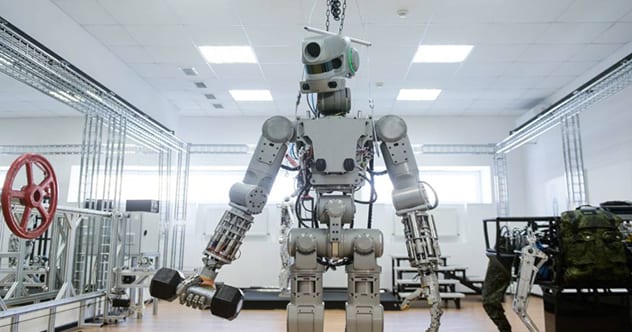 Movies and TV
Movies and TV  Movies and TV
Movies and TV  History
History 10 Momentous Events That Also Occurred on July 4th
 Animals
Animals 10 Times Desperate Animals Asked People for Help… and Got It
 Movies and TV
Movies and TV 10 Movie Flops That Found Their Way to Cult Classic Status
 History
History 10 Things You Never Knew About Presidential First Ladies
 Movies and TV
Movies and TV 10 Zombie Movies That Will Actually Terrify You
 Humans
Humans 10 Times Scientists Were Absolutely Sure… and Absolutely Wrong
 Our World
Our World 10 Pivotal Moments for Life on Earth
 Movies and TV
Movies and TV 10 Most Realistic Medical TV Shows of All Time
 Creepy
Creepy 10 Eerie & Mysterious Ghosts of the Pacific Coast
 Movies and TV
Movies and TV 10 Music Biopics That Actually Got It Right
 History
History 10 Momentous Events That Also Occurred on July 4th
 Animals
Animals 10 Times Desperate Animals Asked People for Help… and Got It
Who's Behind Listverse?

Jamie Frater
Head Editor
Jamie founded Listverse due to an insatiable desire to share fascinating, obscure, and bizarre facts. He has been a guest speaker on numerous national radio and television stations and is a five time published author.
More About Us Movies and TV
Movies and TV 10 Movie Flops That Found Their Way to Cult Classic Status
 History
History 10 Things You Never Knew About Presidential First Ladies
 Movies and TV
Movies and TV 10 Zombie Movies That Will Actually Terrify You
 Humans
Humans 10 Times Scientists Were Absolutely Sure… and Absolutely Wrong
 Our World
Our World 10 Pivotal Moments for Life on Earth
 Movies and TV
Movies and TV 10 Most Realistic Medical TV Shows of All Time
 Creepy
Creepy 10 Eerie & Mysterious Ghosts of the Pacific Coast
10 Absurd Ads That Tried To Cash In On Tragedy
Turn on the news, and you’ll be deluged by stories of horrific tragedies happening across the world. Civil wars, famines, terrorist attacks, and worse tear our planet apart on a daily basis, and the only human response is deep sympathy.
But advertisers aren’t exactly human. Where most of us see pointless suffering, they see gigantic dollar signs.
10A Dubai Gym Promotes Fitness With The Holocaust

In 2012, Dubai’s Circuit Factory fitness center posted images to its Facebook page showing a picture of Auschwitz and the tagline “Kiss your calories goodbye.”
Unsurprisingly, people were offended by the suggestion that murdering millions is somehow equivalent to getting a good workout. Faced with a growing backlash, Circuit Factory’s owner then managed to make things even worse by defending the ad, saying that exercise classes are “like a calorie concentration camp.”
The gym pulled the photo and fired the party responsible. However, the story doesn’t end there. Because the world is a strange and frequently awful place, Circuit Factory received a massive business boost off the back of the controversy. According to the owner, demand grew so high that they were worried they wouldn’t be able to keep up with it. It just goes to prove the old adage “there’s no such thing as bad publicity.”
9Vodafone Caused The Egyptian Revolution
Remember the Egyptian Revolution in January 2011, back before everything went to hell? Remember how it was all started by a single Vodafone advert? Of course you don’t; the factors contributing to the overthrow of Mubarak were diverse, widespread, and incredibly complex. Yet that didn’t stop Vodafone from trying to publicly take the credit.
In a web ad posted shortly after Mubarak stepped down, Vodafone Egypt edited together scenes from a commercial they’d earlier broadcast with scenes of the revolution, suggesting that the former had caused the latter. The new ad ended with the words “We did not send people to the streets . . . we only reminded Egyptians how powerful they were.” It then showed quotes from revolutionaries implying that sending people to the streets was exactly what Vodafone had done.
Aside from being insulting, the feel-good ad glossed over the absurd number of people tortured and killed in the uprising. It also sidestepped how Vodafone had followed Mubarak’s orders to shut down their network when Egyptians perhaps needed it most. When the news went viral, Vodafone quickly engaged in damage control, denying ever approving the ad.
Now that the country is under control of a brutal dictator whom intellectuals have compared to Pinochet, we’re wondering if Vodafone would still like credit for the revolution.
8McDonald’s Mocks Mental Illness Ads

In 2013, a gloomy advert appeared on Boston subway cars. Featuring a young woman with her face in her hands beside the tagline “you’re not alone,” it looked like one of the many mental health helpline ads across the network. The difference: This one ended with the smaller words “millions of people love the Big Mac.” McDonald’s claimed that the posters were commissioned by an outside agency without company approval.
The poster also included a number that went straight to a McDonald’s call center, framed as though it were a help line. This upset genuine sufferers of depression, who likely needed some sympathy instead of an ad campaign mocking their debilitating illness.
7A German Spa Celebrates Kristallnacht

On November 9, 1938, Nazi storm troopers went on a rampage, destroying German businesses. They smashed the windows of 7,000 shops, burned down 900 synagogues, and killed 91 Jews. The incident became known as Kristallnacht. Three-quarters of a century later, one German spa publicly celebrated the anniversary by offering lovers a romantic break.
Taking place exactly 75 years after the attacks, the Kristall Sauna-Wellness Park hotel’s romantic evening was advertised as “Kristall Nacht” and promised candlelit baths to anyone willing to pay for it. Although the hotel later claimed it was just a big coincidence, this was the only night advertised under the name on their yearly calendar, and it fell on the exact same day as a widely known atrocity with an identical name. Either this was the most unfortunate coincidence in advertising history, or the hotel is secretly run by Joseph Goebbels.
6Hyundai Advertise Their Cars With Suicide
Most people would probably respond to a pitch selling cars with suicide by confiscating your advertising diploma. Not Hyundai’s marketers. In 2013, they commissioned and broadcast a UK commercial featuring a man trying to kill himself by inhaling exhaust fumes.
The punch line is that his suicide attempt fails because the vehicle runs on hydrogen and produces no harmful emissions—or, alternatively, the man was never actually trying to kill himself; he was merely purposely inhaling steam. The advert triggered a flood of complaints. It brought to tears at least one viewer, whose father had killed himself in the manner depicted in the ad.
Hyundai later apologized, stating that they had “no intention” of using the ad. In an opinion piece, online magazine Ad Age accused the company of brazenly lying, saying, “Do you believe that the ad was conceived, storyboarded, cast, shot and edited without Hyundai’s knowledge? If that’s true, I’m Queen Elizabeth.”
5Citroen’s Third Reich Nostalgia
In 2008, automaker Citroen aired a new UK ad about their “unmistakably German” car. The ad is an over-the-top celebration of German culture: the music of Wagner, dirndl dresses, pork sausages, and even random German shepherd dogs. Then, in the absolute last second of the ad, comes the punch line—“made in France,” because while Citroen may emulate German engineering, it’s actually a French company.
Some members of the British government were convinced that the ad’s opening deliberately mimicked Nazi propaganda in the style of Triumph of the Will. The ad features Berlin’s 1936 Olympic Stadium (built when the Nazis were in power), the classic German heraldic eagle (associated by some with Nazi rule), and gothic lettering (a typeface “not seen in Germany since 1945,” insisted one offended British MP).
Perhaps the British were sensitive because they had been bombed so heavily by the Nazis. Citroen, bewildered, simply responded that their ad was “humorous and fun.”
4Sainsbury’s World War I Hypocrisy
Exactly a century ago, the nations of Europe tore themselves apart in the bloodiest way imaginable. The Great War, as it was known at the time, killed 8.5 million people, wounded another 21 million, and virtually wiped out a generation.
A current ad from UK supermarket chain Sainsbury’s recreates the famous Christmas Truce between German and British forces. Although plenty in the British press have praised it for its poignancy, others have pointed out that it uses an ultra-sanitized version of a bloody conflict to “flog groceries.”
This would be divisive enough, but the campaign also has an extra layer of hypocrisy. Even as the commercial asks British viewers to respect the fallen and honor their memory, Sainsbury’s is currently planning to demolish one of the country’s largest war memorials and build a superstore over it, against the wishes of local residents. Known as the Bristol Rovers’ Memorial Stadium, the memorial was built to honor hundreds of local rugby players who died in World War I.
3Levi’s Youth Rioting
In 2011, Levi’s launched a new direction for their global “Go Forth” ad campaign. Featuring young people marching in protest, standing up to riot police, and generally taking on the system, the commercials were designed to resonate with the ethos of the Arab Spring.
That summer, England had been paralyzed by a wave of rioting that destroyed entire city centers. Before the dust had settled, Levi’s aired their riot commercial in the country, triggering a public backlash that convinced the company to pull the ad. Although the campaign had been approved months before anyone in England thought to start looting, the decision to release it was branded insensitive.
2Groupon Sells Discount Food With Tibetan Oppression
The modern history of Tibet isn’t exactly a happy one. Under Chinese rule, simply having a picture of the Dalai Lama can get you tortured, and children as young as six have been seized. Discount company Groupon tied the issue into one of their ad campaigns, but their ineptness left customers confused and offended.
Aired during the 2011 Super Bowl, the ad starts with actor Timothy Hutton warning that Tibetan culture is being wiped out. As pictures of the country and its people play over mournful music, Hutton bemoans the current human rights situation . . . before suddenly interjecting, “but they still whip up an amazing fish curry.” He then explains how he used Groupon to treat himself to a cheap curry.
It seemed as though the company were mocking a serious issue to sell their service. But viewers who visited the website that the ad promoted discovered that the company really was raising money for Tibet, in addition to selling their usual discounts. According to a company representative, they weren’t trying to make fun of Tibet—they were trying to make fun of themselves. Regardless, the campaign failed, and Groupon pulled the ad.
19/11 Sells Everything

Though it’s a tragedy still fresh in many people’s minds, marketers flock to 9/11 like empathy-deficient flies to feces. Eleven years after the attack, Business Insider managed to compile 10 separate ad campaigns that had misused Twin Towers imagery.
A New Zealand anti-smoking ad that depicted two cigarettes as the towers, along with the tagline “Terrorism-related deaths since 2001: 11,377. Tobacco-related deaths since 2001: 30,000,000.” The ad above for the newspaper Courrier International suggested that had the towers’ architects anticipated the clients’ needs better, the planes would have harmlessly flown overhead.
But nothing could compare to the ad from Brazilian company Ortobom. Featuring a calendar with the date September 11 highlighted, it featured the tagline “there’s always something that takes away your sleep.” Then it went on to add, “choose your mattress well.”








